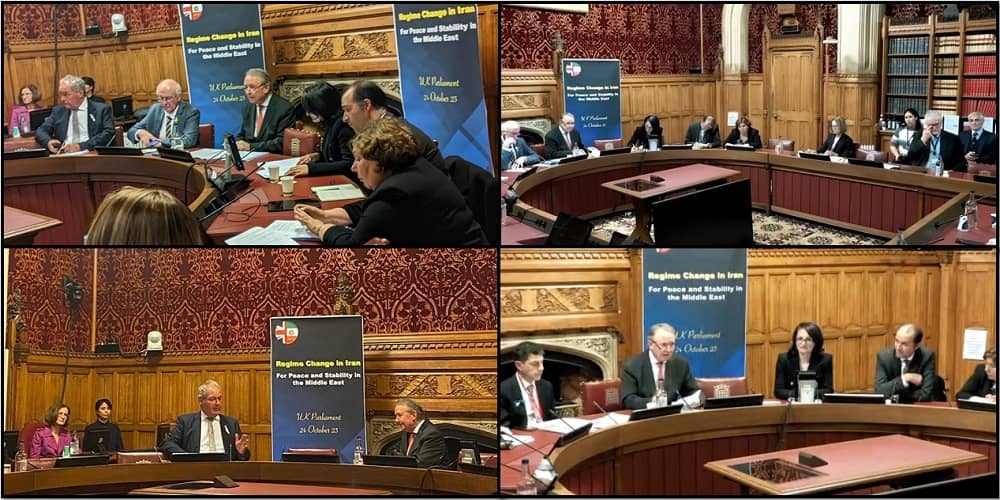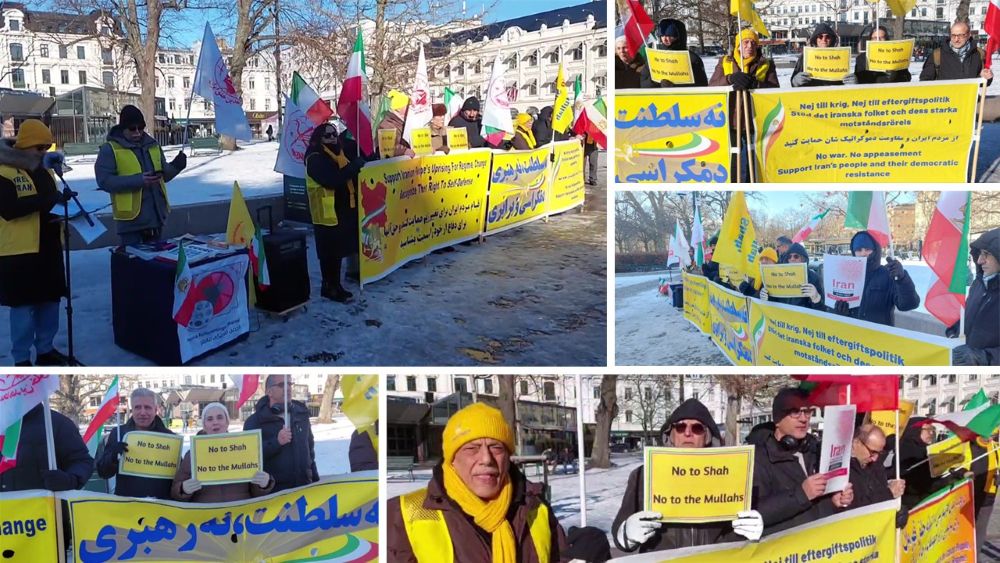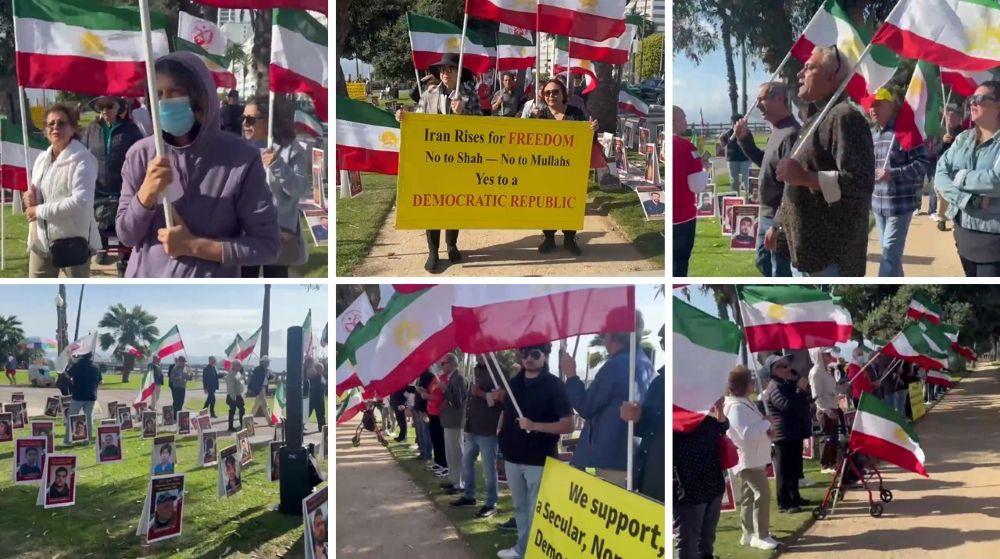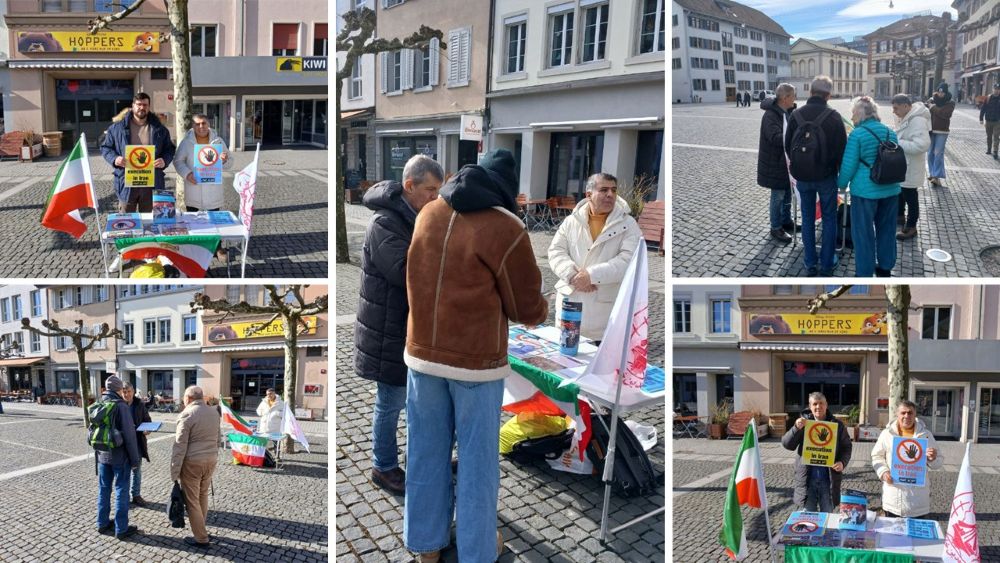
A group of cross-party members of parliament, Middle Eastern affairs and counter-terrorism experts, and representatives from various Anglo-Iranian Associations met at the UK Parliament on Tuesday, October 24, 2023. They discussed the Iranian regime’s actions in the Middle East, which were viewed as destabilizing, and the potential for popular protests within Iran.
Speakers at the meeting emphasized the Iranian regime’s role in inciting conflict in the Middle East to secure its own survival. They also discussed the need for the UK to adopt a strong policy toward Tehran, holding the regime accountable for its involvement in terrorism and regional hostilities while supporting the democratic aspirations of the Iranian people.
One of the key calls during the meeting was to designate the Islamic Revolutionary Guard Corps (IRGC) as a terrorist organization. Various participants expressed their support for protests led by Iranian women.
Professor Lord Alton of Liverpool, co-president of the British Committee for Iran Freedom, emphasized the Iranian regime’s strategic export of terrorism and disruption in the Middle East and beyond to maintain its authoritarian rule domestically. He stressed that the regime perceives the democratic aspirations of the Iranian people as a significant threat to its totalitarian control.
He highlighted the ongoing critical geopolitical challenge in the Middle East, identifying it as the struggle between the oppressive religious regime in Iran and the people’s desire for self-governance. Recent events in Iran and the surrounding region serve as compelling evidence supporting this assertion.
For the past forty years, the National Council of Resistance of Iran (NCRI) has been functioning as an external parliamentary body advocating for democratic reform in Iran. Its President-elect, Mrs. Rajavi, has presented a Ten-Point democratic plan representing the Iranian people’s yearnings, providing a legitimate and widely supported alternative to the current regime.
https://t.co/R7sx57dHog pic.twitter.com/j5PJhzl6wR
— Lord (David) Alton (@DavidAltonHL) October 25, 2023
In a video message to the meeting, Mrs. Maryam Rajavi the President-elect of the National Council of Resistance of Iran (NCRI) stated the following points:
“I have emphasized for over two decades that the regime’s aggressive actions in the region pose a danger far greater than its nuclear program. Khamenei and his Revolutionary Guards have initiated a destructive conflict in the Middle East as a means to evade their own potential overthrow. Without this regime, the current conflict in the region would not have taken place. The regime claims to champion the cause of the Palestinians, but in reality, it acts against their interests.
Khamenei has openly stated that if he doesn’t engage in conflicts in Gaza, Lebanon, Syria, Iraq, and Yemen, he would have to confront protesters within Tehran and other Iranian cities.
Unfortunately, Western countries have disregarded the Iranian Resistance’s warnings and disclosures about the regime’s belligerence over the past three decades, especially the role of the IRGC and the terrorist Quds Force, along with its proxies.
For more than two decades, we have been insisting that the IRGC should be designated as a terrorist organization. Any delay in taking this step will empower the IRGC to expand its influence, continue its nuclear projects with the use of European facilities, promote terrorism and aggression, and gain access to equipment used for suppressing dissent within Iran.
The President-elect of the NCRI called upon the UK Parliament and Government to acknowledge the Iranian people’s struggle to overthrow the regime and the legitimate resistance of Iranian youth against the IRGC.”
Message to the Conference at the UK Parliament:
— Maryam Rajavi (@Maryam_Rajavi) October 25, 2023
Proscribe IRGC; Regime Change in #Iran Prelude to Peace and Stability in the Middle East
It is time to designate the IRGC as a terrorist entity#BlacklistIRGCpic.twitter.com/G4zYZt0w36https://t.co/SAlvabxqB5
Professor Walid Phares, who serves as the Co-Secretary General of the Transatlantic Parliamentary Group on Counterterrorism and National Security and as a Foreign Policy advisor to several US Presidential candidates, participated in the meeting via video link from the United States.
During his address at the conference, Professor Walid Phares underscored the Iranian regime’s longstanding control over various terrorist organizations spanning the last three decades. He emphasized that Tehran functions as a central authority, operating a coordinated war room in Tehran itself, while providing support and leadership to militias in various Middle Eastern countries through the IRGC and the Quds Force.
Professor Phares stated, “Since the Mahsa Amini killing and in light of the numerous revolts, demonstrations, and protests we’ve witnessed within Iran and worldwide, these events pose a significant threat to the regime more than anything else in the region.”
Professor Phares called for the designation of the IRGC and all its branches as a terrorist organization. He stressed that this designation is crucial for implementing financial, political, and other measures against these terrorist organizations. He also emphasized the importance of supporting the opposition in Iran to promote democracy and freedom.
Told members from the House of the Lords in #London that one major reason why the #IranRegime may have ordered #Hamas to strike in Israel is a move to deflect attention from the #IranRevolution in order to crush it.
— Walid Phares (@WalidPhares) October 24, 2023
MP Bob Blackman, who serves as the co-president of the International Committee of Parliamentarians for a Democratic Iran (ICPDI), stated, “Within Parliament, serious concerns exist not only regarding the regime in Tehran but also its far-reaching influence across the Middle East and even into our own country. Our Government should officially designate the IRGC, a stance supported by all political parties in the House of Commons. When dealing with terrorists, the approach is straightforward: we cannot compromise.”
“We must maintain a strong policy on Iran. Rather than rewarding the regime for its involvement in terrorism and aggression, all democratic nations should stand in solidarity with the courageous people of Iran and provide them with an opportunity. The NCRI is the only credible organization for this purpose, and the only credible individual I’ve encountered concerning Iran is Madam Rajavi. We must convey to the mullahs in unequivocal terms that their time is over. They must yield to the democratic aspirations of the Iranian people. We have a democratic alternative that can be exceptionally successful.”
“Therefore, our government should recognize the Iranian people’s right to defend themselves against the IRGC and other repressive forces, acknowledge the NCRI and Madam Rajavi as the democratic alternative to the regime, and recognize Ashraf 3 as a stronghold for a free and democratic Iran.”
Yesterday, I attended the House of Lords meeting on the #IRGC 's role in destabilising the Middle East and the need to proscribe the IRGC, especially given their suspected involvement in the #Hamas attacks. pic.twitter.com/UYt6sGCg05
— Bob Blackman (@BobBlackman) October 25, 2023
MP Alex Sobel stated, “The prescription of the IRGC here is a minimum action. The UK’s most influential role is its financial center, and it should cut off the regime’s ability to move money in and out of the United Kingdom, conduct trade, and manage its financial institutions.”
“My experience with Iran and recent events there mirror the narrative presented by Maryam Rajavi. The vision we see from the NCRI and Maryam Rajavi is that Iran can transform into a force for good in the world instead of being a destabilizing force responsible for countless deaths. Imagine how much better our world could be.”
MP Jim Shannon expressed, “The policy of appeasement in recent years has emboldened the regime to expand its influence, believing it can continue to harm countless lives with little to no consequences while limiting the rights of dissidents in exile. Enough is enough.”
“Today, I echo the Iranian people’s call for a democratic republic and offer my full support for Maryam Rajavi’s Ten-Point Plan. Let us all redouble our efforts so that the scenes we witness today will never be repeated.”
MP Marie Rimmer paid tribute to the unwavering spirit of Iranian women, stating that “their courage and resilience cannot be crushed” and will pave the way for democratic change.
MP Mary Glindon conveyed her solidarity with the Iranian people striving for a free and democratic state, assuring them of her commitment to support their efforts in any way she can.
Azadeh Zabeti, co-president of the Committee of Anglo-Iranian Lawyers in the UK, and Musa Zahed, founding director of the Middle East Forum for Development, also addressed the meeting. They emphasized the need for the UK and the West to recognize the Iranian people’s struggle to bring about change in the regime and establish a free and democratic Iran, while supporting the organized opposition.
They further urged the UK Government to designate the IRGC as a terrorist organization to halt the regime’s destabilizing activities and interventions in the region.
The meeting was also attended by Lord Lucas, the Rt Hon. Lord Whitty, and Baroness Meyer CBE, a member of the Joint Committee on Human Rights.



